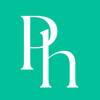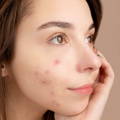
PAIGE
A BEGINERS GUIDE TO BHAs
Skin friendly acids are huge in skincare – we’ve seen their meteoric rise to fame over the last few years, particularly Salicylic Acid, a form of BHA, which is the most popular form of acid. In fact, it is the most searched for ingredient full stop!
We wanted to share all things BHA. Why Salicylic Acid is queen and why its lesser-known sibling Betaine Salicylate could be the better option your skin is missing out on.

WHAT IS BHA?
BHA’s are Beta Hydroxy Acids and they work like AHAs, such as Glycolic Acid & Lactic Acid to exfoliate the skin.
There are three main acid groups: BHAs, AHAs and PHAs - we go into more detail here, in our Essential Guide to Skin Care Acids blog
The main difference between AHA’s and BHAs is that BHAs are oil soluble and AHAs are water soluble.
This means that BHAs penetrate deeper into pores to unclog them, making them a great ingredient to target blemishes, blackheads & whiteheads.
AHAs on the other hand work better on the skins surface to reveal fresher, newer skin.
PHAs are the gentlest of all acids. They have a larger molecule size, so penetrate the skin more slowly and less deeply, helping to hydrate and gently exfoliate. Making them a great choice for sensitive skin.
BENEFITS OF BHA
BHA’s can help with a number of skin concerns but are particularly great for oily and acne prone skin. With its anti-microbial properties, it works by clearing pores of dead skin cells, sebum and other skin surface debris which can lead to skin breakouts, blackheads & whiteheads, resulting in a smooth skin texture with minimised pores.
WHICH BHA SHOULD I USE?
There are two BHA types to look out for in skincare products:
Salicylic Acid
The most popular form of BHA, originally derived from willow bark, commonly used in skincare products to treat acne but can be irritating for some skin types
Betaine Salicylate
A less commonly used and researched BHA that combines Salicylic Acid and Betaine so that it is gentler on skin.
If you new to skincare, we know it can all get a bit confusing, and if you're looking for new ingredients to tackle breakouts, you want to make sure you're as informed as possible - so here is a comparison of both Salicylic Acid and Betaine Salicylate
SALICYLIC ACID
The most common form of BHA, said to be most effective at treating acne at a 2% inclusion level
Oil soluble exfoliant effective at unclogging pores
Reduces blackheads, whiteheads, and can balance oil production
Antimicrobial properties
May not be suitable for dry or sensitive skin
Can irritate skin if overused or applied to unsuitable skin types
BETAINE SALICYLATE
A BHA said to provide similar, if not the same, effects as 2% Salicylic Acid, at 4% inclusion level
Oil soluble exfoliant effective at unclogging pores
Reduces blackheads, whiteheads, and can balance oil production
Antimicrobial and moisturising properties
Suitable for all skin types, including sensitive
Oily, acne prone skin types that can tolerate Salicylic Acid may not find it as effective
THE K-BEAUTY EFFECT

Both BHA’s seem comparable, so you could question why Betaine Salicylate isn’t as widely used. Well, this could be down to where in the world you shop your skincare products. You will find Betaine Salicylate in lot of Korean beauty products, because the level of Salicylic Acid is heavily restricted in Korea at 0.5%, compared with 2% in the EU/FDA, therefore Salicylic Acid has been replaced with Betaine Salicylate.
Over recent years, Korean Beauty has continued to shape our western beauty regimes, particularly when it comes to how to effectively care for oily and acne prone skin. It was normal practice for western based consumers to use products that dry out spots, and we would always be on the hunt quick fixes! But K-Beauty has instead taught us that hydration is key and that good skin requires consistency. This is particularly true when caring for oily and acne prone skin. If we dry out our skin, it could compensate by over producing oil, and the overuse of certain ingredients, such as Salicylic Acid, could compromise our skin barrier. All of which can lead to more breakouts!
IS BHA AN EFFECTIVE INGREDEINT FOR SKINCARE?
Hell yes!
BHA has been trending thanks to it featuring in two popular products - Paula’s Choice Skin Perfecting 2% BHA Liquid Exfoliant and COSRX Blackhead Power liquid.
With one product sold every 7 seconds, it’s safe to say that Paula’s choice has gained cult status with their product which promises smoother, clearer, more radiant-looking skin, mainly thanks to the use of 2% salicylic acid.
More recently, customers have discovered an alternative to this product – the COSRX Blackhead Power liquid, dubbed the more affordable, gentler option to Paula’s choice BHA liquid by many influencers, including TikToker @misskevine who introduced the dupe. The TikTok video reached almost half a million views in just 24 hours.
Like others, Miss Kavine finds the Paula’s Choice formula too harsh for their skin so for them COSRX is a great alternative because it gives all the same benefits, without the dryness or irritation. This is likely down to the type of BHA used. Instead of salicylic acid, COSRX uses Betaine Salicylate, and that’s what makes it a lot gentler.
In our new BHA PHA Pore Refining Solution we wanted to target blemishes blackheads and pores but knew that we wanted to make it as skin friendly as possible, so we used Betaine Salicylate rather than Salicylic Acid.
If you feel ready to try a BHA product but want to start of gently, then our BHA PHA Pore Refining Solution could be a great start. This is our newest addition to our range and is an exfoliator and hydrator - we love the dual benefits of this one!
Combines an effective and gentle blend of acids that can be used daily on all types, including sensitive.
Simultaneously hydrates skin and balances oil production.
Exfoliates skin on multiple levels. BHA helps to remove gunk from pores that could lead to blackheads, whiteheads, and blemishes. PHA exfoliates upper levels of the skin to improve overall tone and texture.
Helps to further minimise pore appearance thanks to the addition of Chamomile extract which is a powerful antioxidant that also has a calming and brightening effect.
FUTURE INGREDIENT TRENDS
We’re living a world of skintellectuals, who use social media and skin communities to educate themselves on the best ingredients and regimes for their skin type. Because of overuse, incorrect ingredient layering or simply using the wrong product, it seems like there is a growing interest in gentle ingredient alternatives, which means we’re likely to see a rise in popularity of ingredients such as Betaine Salicylate and Gluconolactone (take a read our PHA blog – The Best Exfoliant for Sensitive Skin), as more people realise that short term quick fixes can do our skin more harm than good. Instead, gentle levels with hydrating, barrier protecting properties will have greater long-term benefits!
For more information on how to best care for acne prone skin, visit our blog - How to care for Blemish Prone Skin.
GET IN TOUCH
We hope that you've found this blog helpful - if you have any questions or would like to share your skincare journey with us, we'd love to hear from you. You can get in touch via the form below or by DM on IG.






